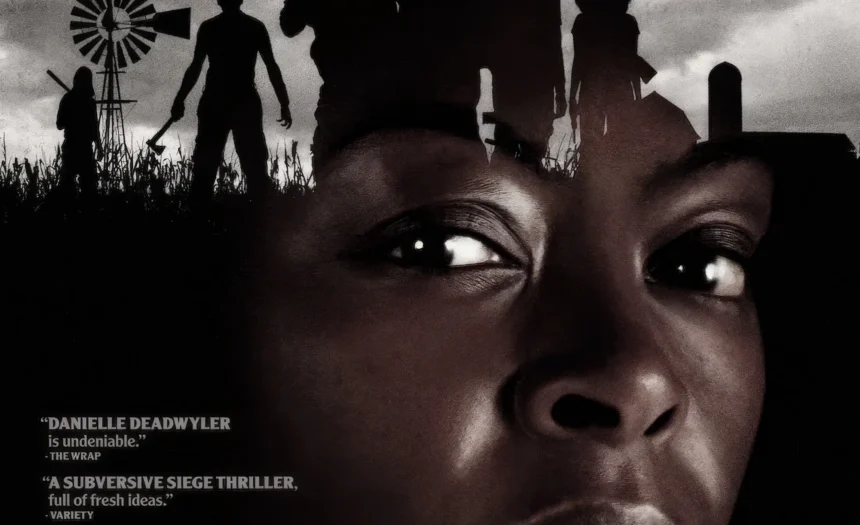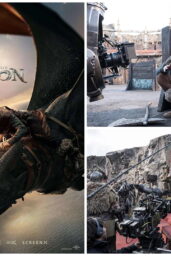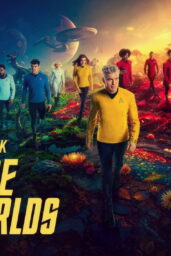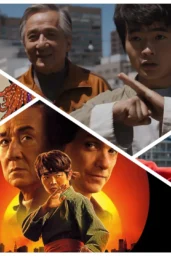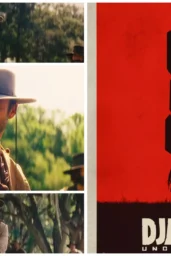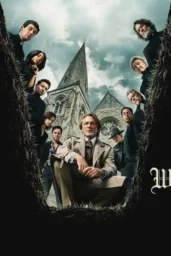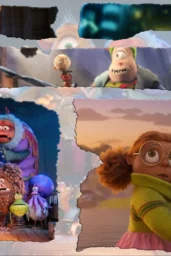The 40 Acres poster is a masterclass in visual storytelling, blending intensity and mystery to hook viewers. At its core is a close-up of a woman's face—likely Danielle Deadwyler as Hailey Freeman—her wide, vigilant eyes and serious expression dominating the lower two-thirds. The grayscale, almost sepia-toned image gives her face a stark, timeless quality, as if she's carrying centuries of struggle. Overlaid across her features are black silhouettes of figures in a field, each adding to the narrative:
- A tall figure with a rifle, suggesting a defensive or threatening stance.
- Another wielding a raised axe, amplifying the sense of danger.
- A surreal figure with antlers, hinting at symbolic or supernatural elements.
- A child-like figure holding a bag, evoking family stakes.
The background reinforces the film's rural, post-apocalyptic setting: a cloudy, overcast sky looms above, while a windmill and silo in the lower corners ground the scene in an agricultural context. The muted color palette, punctuated by red for the title “40 ACRES” and Deadwyler's name, creates a visceral focal point. The tagline “GET OFF OUR LAND” in bold white letters at the top is a defiant rallying cry, aligning with the film's plot of a family defending their homestead.
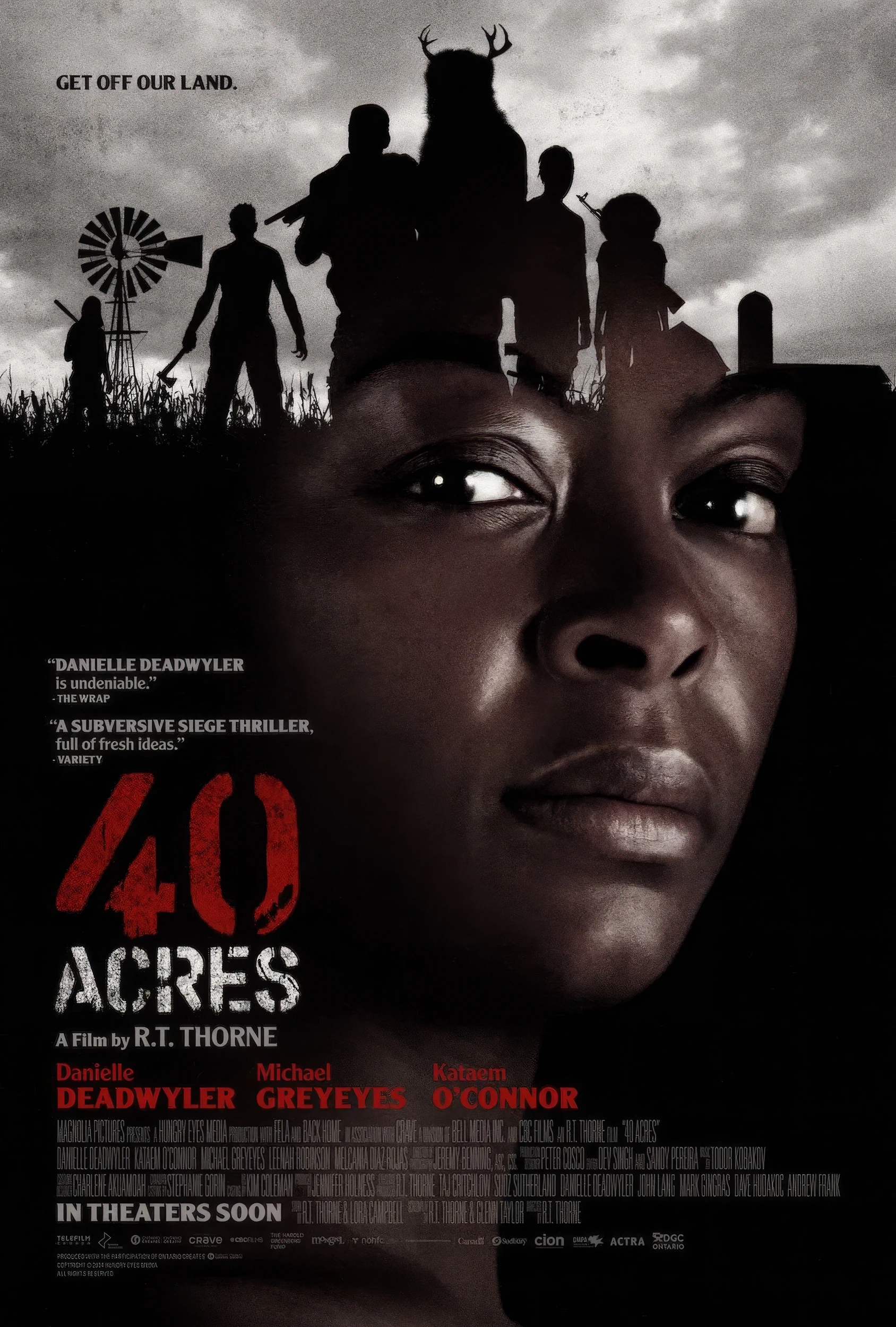
Additional text includes critical praise: “DANIELLE DEADWYLER IS UNDENIABLE” from The Wrap and “A SUBVERSIVE SIEGE THRILLER, FULL OF FRESH IDEAS” from Variety. These quotes, strategically placed over the woman's face, build credibility and highlight Deadwyler's star power. The bottom lists director R.T. Thorne, lead actors (Deadwyler, Michael Greyeyes, Kataem O'Connor), and production details, with “IN THEATERS SOON” signaling an imminent release.
The composition is dynamic yet balanced. The upper half, with silhouettes and the tagline, conveys scale and threat, while the lower half, anchored by the woman's face and title, grounds the poster emotionally. The layering of silhouettes over her face creates a ghostly effect, perhaps symbolizing how external threats weigh on personal identity. The distressed texture and grainy quality enhance the gritty, raw feel, perfectly suiting a “subversive siege thriller.”
Personal Opinion: I'm impressed by the poster's ability to convey so much with so little. The woman's gaze is magnetic, pulling you into her world, while the silhouettes add layers of intrigue. The red title pops like a warning shot, and the antlered figure teases something unexpected—maybe a cultural or supernatural twist. It's a poster that doesn't just sell a movie; it demands your attention and leaves you questioning. If the film matches this intensity, we're in for a treat.
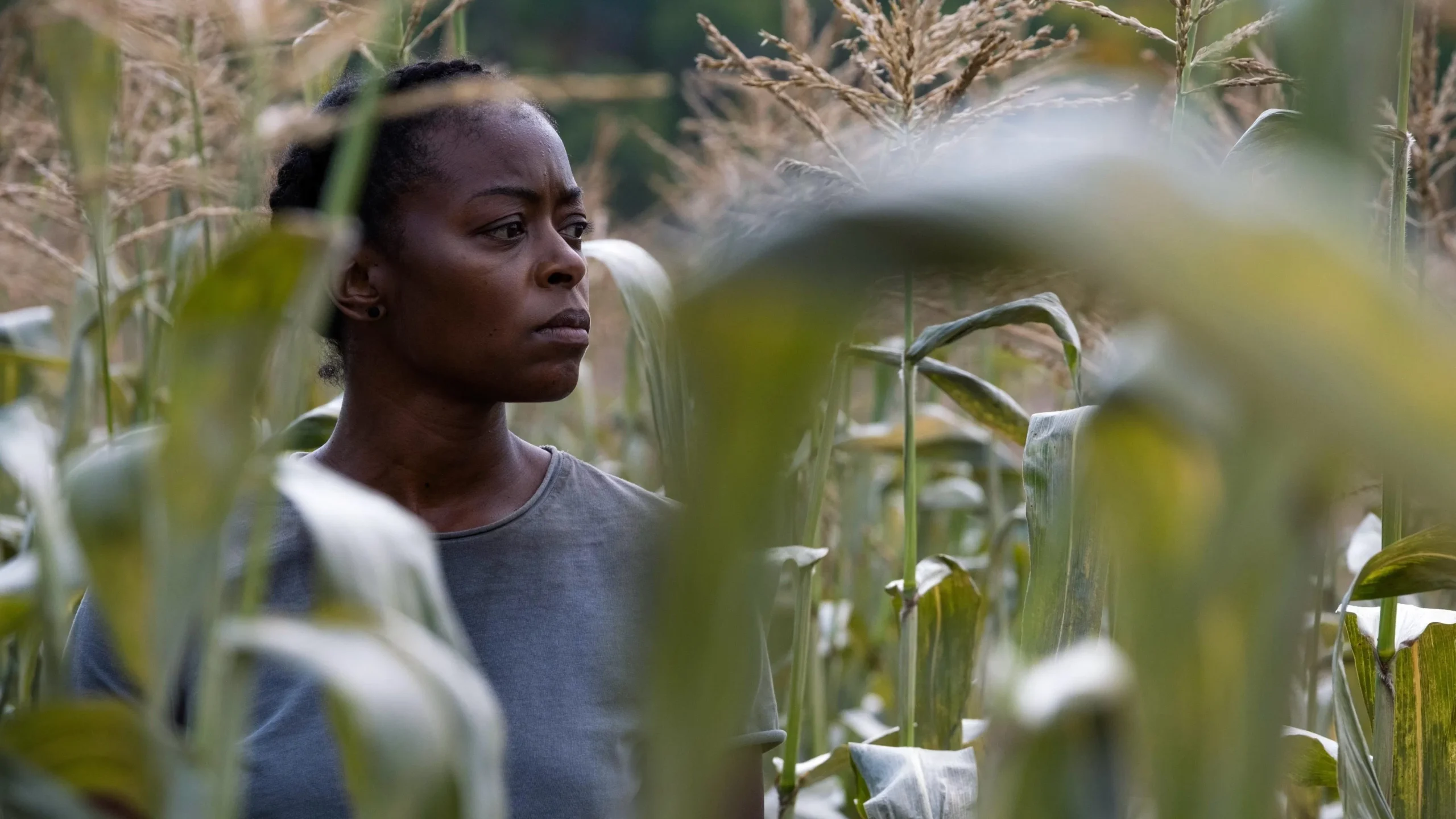
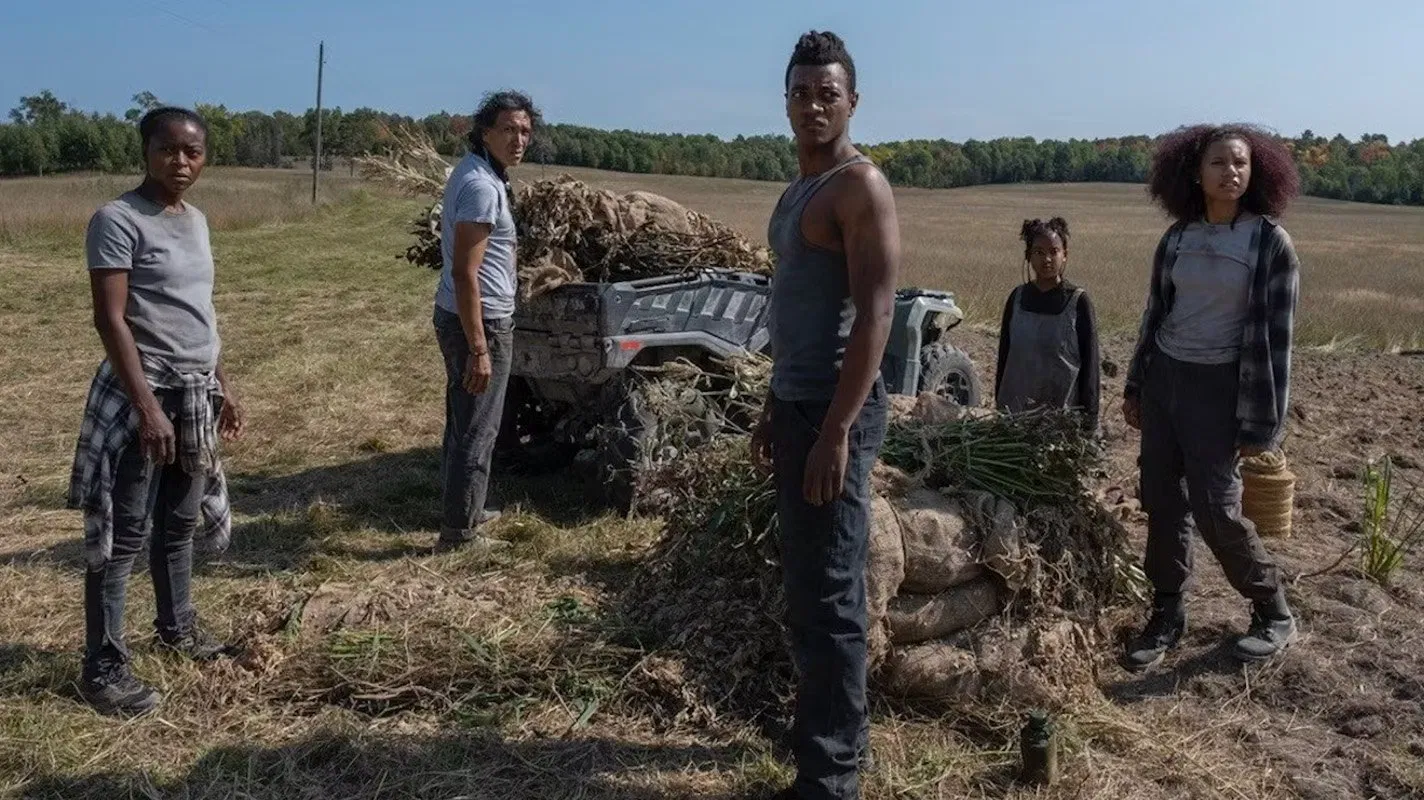
Trailer First Impressions: Subverting the Post-Apocalyptic Genre
While I haven't watched the trailer directly, descriptions from sources like Bloody Disgusting and Rotten Tomatoes paint a vivid picture. The 40 Acres trailer likely opens with a desolate, famine-stricken landscape, setting the stage for a post-apocalyptic world ravaged by plagues and wars. Quick cuts probably show the Freeman family—Hailey (Deadwyler), her partner Galen (Greyeyes), and their children—working their farm, only to face sudden attacks from raiders or cannibals. A voiceover, possibly Hailey's, might speak of survival's cost, echoing the source material's line: “What good is surviving the end of the world if it means snuffing out your own humanity?”
The trailer seems to balance action—tense standoffs, brutal combat—with emotional beats. We likely see Hailey training her children to fight, reflecting her past as a soldier, and her son Emanuel (O'Connor) grappling with his need for connection when he meets a young woman (Milcania Diaz-Rojas) in the forest, a moment that risks the family's safety. These glimpses suggest a story where love and loyalty are as vital as weapons. Deadwyler's performance appears central, her eyes conveying “many lifetimes of pain and struggle,” as noted in Rotten Tomatoes.
What makes the trailer stand out is its genre-bending approach. It's not just another post-apocalyptic spectacle like Mad Max: Fury Road. Instead, it weaves in family drama and social commentary, centering on a Black family descended from American Civil War migrants. This historical context, highlighted in Wikipedia, adds depth, making their fight for 40 acres a defense of legacy as much as land. The trailer's tone, described as gritty and unflinching, promises a film that's both visceral and thought-provoking.
Historical Context: A New Voice in Dystopian Cinema
Post-apocalyptic cinema has surged over the past decade, with films like The Road (2009), Mad Max: Fury Road (2015), and TV series like The Walking Dead (2010–2022) defining the genre. These stories often focus on external threats—zombies, warlords, or environmental collapse—with survival as the primary stakes. However, 40 Acres appears to carve a unique niche by emphasizing internal conflicts and historical identity.
| Film/Series | Release Year | Core Theme | Protagonist Focus | Historical Context |
|---|---|---|---|---|
| The Road | 2009 | Survival in a bleak wasteland | White father and son | Minimal |
| Mad Max: Fury Road | 2015 | Action-driven rebellion | White male and female leads | Post-industrial chaos |
| The Walking Dead | 2010–2022 | Community survival vs. zombies | Diverse ensemble | Modern societal collapse |
| The Book of Eli | 2010 | Faith and survival | Black male lead | Biblical undertones |
| 40 Acres | 2024 | Family legacy and survival | Black family | Civil War migration |
40 Acres shares similarities with The Book of Eli, which also features a Black protagonist (Denzel Washington) and explores faith in a dystopian world, but it seems more grounded in specific historical roots. Unlike The Walking Dead's ensemble focus, 40 Acres zooms in on a single family, making their personal stakes feel universal. Its emphasis on a Black family's legacy sets it apart from the genre's typical white-led narratives, addressing a gap noted in critiques of dystopian cinema's lack of diversity.
This approach aligns with a broader industry trend: a push for inclusive storytelling. Films like Get Out (2017) and Us (2019) have shown how genre films can tackle race and identity, and 40 Acres seems to follow suit, using the post-apocalyptic framework to explore resilience and heritage. What makes it significant is its Canadian perspective and focus on Civil War migrants, a narrative rarely explored in mainstream cinema.
Why 40 Acres Matters
Here's the uncomfortable truth: post-apocalyptic stories often sideline marginalized voices, casting them as sidekicks or victims. 40 Acres flips that script, placing a Black family front and center as heroes of their own story. The trailer's focus on Deadwyler's Hailey—a warrior-matriarch balancing survival and humanity—suggests a performance that could redefine genre expectations, much like Viola Davis did in The Woman King (2022). The poster's haunting imagery and the trailer's blend of action and heart hint at a film that's both thrilling and meaningful.
But there's a risk. If the film leans too heavily on action at the expense of its deeper themes, it could lose what makes it unique. The trailer's promise of “fresh ideas” (Variety) sets a high bar, and its success will depend on balancing spectacle with substance. Still, the buzz around Deadwyler's performance and Thorne's directorial debut is encouraging.
If the trailer and poster are any indication, 40 Acres is shaping up to be a must-watch for fans of thought-provoking cinema. It's not just about surviving the end of the world; it's about what you hold onto when everything else is gone. Mark your calendars for the theatrical release, and prepare for a film that might just challenge how you see the apocalypse. Would you fight for your 40 acres? Share your thoughts below.

